43 start with E start with E


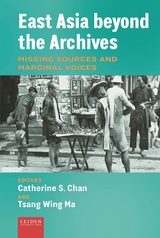




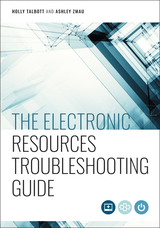
A library user can’t access an article. Your log in credentials won’t work. In the realm of electronic resources everything runs smoothly—until suddenly, without warning, it doesn’t. Invariably, systems will break down, but a trial and error approach to finding out what’s wrong is highly inefficient. This hands-on guide from two expert ERM librarians walks you through the essentials of troubleshooting. It outlines a methodical process that will help you identify the source of a problem even when it’s not obvious and take steps to reach a resolution. With the goal of developing a library-wide workflow in mind, this guide will teach you how to
- familiarize yourself with the components of electronic resources, using flowchart diagrams of common access chains such as discovery services, knowledge bases, research guides, and library services platforms;
- navigate the complete triage and troubleshooting workflow, illustrated through 14 in-depth examples;
- recognize the symptoms of common access disruptions;
- conduct efficient troubleshooting interviews;
- manage help tickets and design problem reports that capture key information without overburdening the user;
- create publicly available help pages for problems originating with users’ devices or computers;
- communicate with vendors and IT personnel for speedy resolutions, providing dozens of clear definitions of library and technology terms that will help you minimize confusion; and
- customize your own troubleshooting workflow chart for common use across departments and staff hierarchies.

This book follows the ways in which objects may be identified, gathered, arranged, conceptualized and even displayed rather than by “discovering” artifacts in an archive and then asking how they came to be there. The authors approach material culture outside the traditional bounds of learning about the past. Their essays are varied not only in subject matter but also in narrative format and conceptual reach, making the volume accessible and easy to navigate for a quick reference or, if read straight through, build toward a new way to think about material culture.




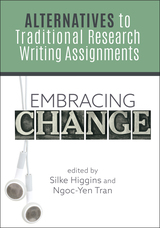
Embracing Change: Alternatives to Traditional Research Writing Assignments collects existing alternative assignments from librarians and classroom instructors and examines their benefits and drawbacks, impact on various student populations, and the support needed to make them successful. In two parts—Analog-Driven Assignments and Technology-Driven Assignments—authors offer a wealth of insight into the theory and practice of utilizing alternative assignments. Case studies detail the development of assignments, their implementation, lessons learned, and assessment, and provide examples and reference materials for incorporating or refining your own alternative assignments. Projects covered include:
- how students engage with writing gray literature
- producing a local voting guide
- creating museum-level exhibit labels
- composing and printing original poems using a letterpress
- developing finding aids
- writing a children’s book
- creating infographics and lightning talk videos
- learning digital literacy using podcasts
- a variety of digital humanities projects

Empathy by Design: Empathy-Driven Marketing for Libraries offers step-by-step strategies for understanding why people visit the library and tailoring your marketing with personalization that resonates with users on a deeper level. It provides real-world solutions for understanding your target audience through empathy and demonstrates how to gather and use data to develop messages and programming that fosters meaningful connections and engagement. You’ll find ideas for understanding the customer journey, creating an empathic library brand, and creating empathy-driven marketing strategies, campaigns, content, and tactics.
Today’s library marketers should both understand the effectiveness of using empathy in marketing and use it as a radical tool for advancing our profession’s values of diversity, equity, inclusion, and access. The strategies outlined in Empathy by Design can give you the tools you need to make your marketing—and your library—more targeted and empathic.
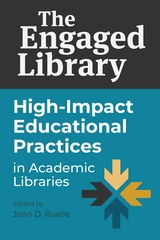

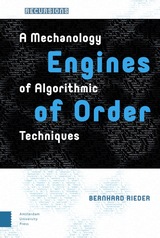
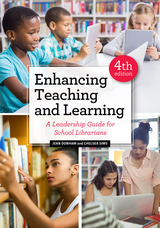
Rapid change calls for informed leadership. The goal of Donham’s text has always been to help school library professionals make a difference in the educational experience and academic attainment of students in their schools. With the addition of new co-author Sims, a junior high school librarian, this newly revised fourth edition rises to the challenge with updates and enhancements that confirm its value as an important resource for both LIS students and current school librarians. Covering all aspects of the school system, including students, curriculum and instruction, principals, district administration, and the community, it demonstrates how to interact and collaborate in order to integrate the school library program throughout these environments. Inside, readers will find
- myriad real-world examples of issues in school librarianship and evidence-based practice;
- discussion of such urgent topics as the educational needs of the iGen (those born between 1995 and 2012), changing reading habits, the influence of the media, and news literacy and other issues related to the proliferation of fake news;
- updates which touch upon the new AASL Standards, inquiry-based learning, assessment, and library program evaluation;
- specific tactics for establishing the library program as an active player in teaching and learning;
- an overview of education-related technology such as course management systems, the virtual library, makerspaces, information presentation and data representation tools like ScreenCast and Google Maps, online home-school communication, and online student safety and privacy; and
- end-of-chapter discussion scenarios that explore opportunities for the practical application of concepts.
Reflecting changes—professional, theoretical, legal, and political—in both the library field and education, this new edition of a groundbreaking school library text will equip readers to be leaders at their schools and in their communities.


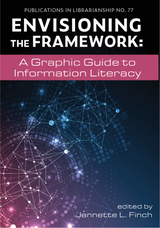
Envisioning the Framework offers a visual opportunity for thought, discovery, and sense-making of the Framework and its concepts. Seventeen chapters packed with full-color illustrations and tables explore topics including:
- LibGuides creation through conceptual integration with the Framework
- fostering interdisciplinary transference
- the convergence of metaliteracy with the Framework
- teaching multimodalities and data visualization
- mapping a culturally responsive information literacy journal for international students
Twenty-first-century information literacy involves the metaliterate learner, reflects seismic changes in the duties and roles of teaching librarians, requires new partnerships with faculty and instructional designers, and emphasizes continuous assessment practices. Envisioning the Framework can help you use symbols and visuals for deeper understanding of the Framework, to map the Framework with teaching and learning objectives, and to tell a coherent story to students featuring the frames and the Framework.
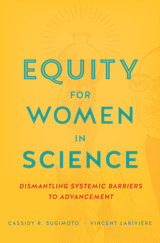
The first large-scale empirical analysis of the gender gap in science, showing how the structure of scientific labor and rewards—publications, citations, funding—systematically obstructs women’s career advancement.
If current trends continue, women and men will be equally represented in the field of biology in 2069. In physics, math, and engineering, women should not expect to reach parity for more than a century. The gender gap in science and technology is narrowing, but at a decidedly unimpressive pace. And even if parity is achievable, what about equity?
Equity for Women in Science, the first large-scale empirical analysis of the global gender gap in science, provides strong evidence that the structures of scientific production and reward impede women’s career advancement. To make their case, Cassidy R. Sugimoto and Vincent Larivière have conducted scientometric analyses using millions of published papers across disciplines. The data show that women are systematically denied the chief currencies of scientific credit: publications and citations. The rising tide of collaboration only exacerbates disparities, with women unlikely to land coveted leadership positions or gain access to global networks. The findings are unequivocal: when published, men are positioned as key contributors and women are relegated to low-visibility technical roles. The intersecting disparities in labor, reward, and resources contribute to cumulative disadvantages for the advancement of women in science.
Alongside their eye-opening analyses, Sugimoto and Larivière offer solutions. The data themselves point the way, showing where existing institutions fall short. A fair and equitable research ecosystem is possible, but the scientific community must first disrupt its own pervasive patterns of gatekeeping.



The scope and reach of information, driven by the explosive growth of information technologies and content types, has expanded dramatically over the past 30 years. The consequences of these changes to records and information management (RIM) professionals are profound, necessitating not only specialized knowledge but added responsibilities. RIM professionals require a professional ethics to guide them in their daily practice and to form a basis for developing and implementing organizational policies, and Mooradian’s new book provides a rigorous outline of such an ethics. Taking an authoritative principles/rules based approach to the subject, this book comprehensively addresses
- the structure of ethics, outlining principles, moral rules, judgements, and exceptions;
- ethical reasoning, from meaning and logic to dilemmas and decision methods;
- the ethical core of RIM, discussing key topics such as organizational context, the positive value of accountability, conflicts of interest, and confidentiality;
- important ethical concerns like copyright and intellectual property, whistleblowing, information leaks, disclosure, and privacy; and
- the relationship between RIM ethics and information governance.
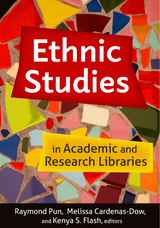
Ethnic Studies in Academic and Research Libraries serves as a snapshot of critical work that library workers are doing to support ethnic studies, including areas focusing on ethnic and racial experiences across the disciplines. Other curriculums or programs may emphasize race, migration, and diasporic studies, and these intersecting areas are highlighted to ensure work supporting ethnic studies is not solely defined by a discipline, but by commitment to programs that uplift underserved and underrepresented ethnic communities and communities of color. Twenty chapters are broken into three thorough sections:
- Instruction, Liaison Engagement, and Outreach
- Collections Projects and Programs
- Collaborations, Special Projects, and Community Partnerships



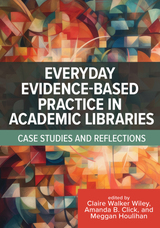
Everyday Evidence-Based Practice in Academic Libraries: Case Studies and Reflections collects excellent, thorough examples of EBP across functional areas of academic libraries and includes many evidence types in a variety of contexts. Five sections explore:
- Understanding Users
- Leadership and Management
- Instruction and Outreach
- Collections
- Open Initiatives
Everyday Evidence-Based Practice in Academic Libraries offers high-quality evidence from a variety of perspectives and inspires a commitment to evidence-based practice in your day-to-day work and library culture.








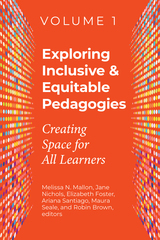
In Exploring Inclusive & Equitable Pedagogies: Creating Space for All Learners, seven thorough sections across two volumes examine:
- Anti-Racist Approaches
- Intentional Information Literacy
- Engendering Care and Empathy
- Community Building
- Universal Design for Learning: An Important Benchmark
- Instructor Identity and Positionality
- Professional Development
Chapters cover topics including dismantling, reexamining, and reconstructing notions of authority in information literacy instruction; teaching technology inclusively; using primary sources to research queer and feminist histories; cocreating knowledge practices with students; prioritizing accessibility in synchronous and asynchronous learning environments; cultural humility, funds of knowledge, and information literacy instruction with first-generation students; designing and managing inclusive group projects; and much more.
To become the instructors our students need, we must adopt the mindsets and develop the underlying skills to enact inclusive and equitable teaching and learning. Exploring Inclusive & Equitable Pedagogies offers reflections, practices, and models that deepen our collective understanding of equitable and inclusive theories and practices and present new grounding for both our individual teaching and our instruction programs.
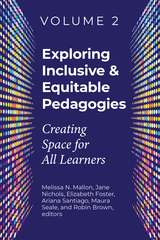
In Exploring Inclusive & Equitable Pedagogies: Creating Space for All Learners, seven thorough sections across two volumes examine:
- Anti-Racist Approaches
- Intentional Information Literacy
- Engendering Care and Empathy
- Community Building
- Universal Design for Learning: An Important Benchmark
- Instructor Identity and Positionality
- Professional Development
Chapters cover topics including dismantling, reexamining, and reconstructing notions of authority in information literacy instruction; teaching technology inclusively; using primary sources to research queer and feminist histories; cocreating knowledge practices with students; prioritizing accessibility in synchronous and asynchronous learning environments; cultural humility, funds of knowledge, and information literacy instruction with first-generation students; designing and managing inclusive group projects; and much more.
To become the instructors our students need, we must adopt the mindsets and develop the underlying skills to enact inclusive and equitable teaching and learning. Exploring Inclusive & Equitable Pedagogies offers reflections, practices, and models that deepen our collective understanding of equitable and inclusive theories and practices and present new grounding for both our individual teaching and our instruction programs.
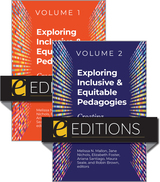
In Exploring Inclusive & Equitable Pedagogies: Creating Space for All Learners, seven thorough sections across two volumes examine:
- Anti-Racist Approaches
- Intentional Information Literacy
- Engendering Care and Empathy
- Community Building
- Universal Design for Learning: An Important Benchmark
- Instructor Identity and Positionality
- Professional Development
Chapters cover topics including dismantling, reexamining, and reconstructing notions of authority in information literacy instruction; teaching technology inclusively; using primary sources to research queer and feminist histories; cocreating knowledge practices with students; prioritizing accessibility in synchronous and asynchronous learning environments; cultural humility, funds of knowledge, and information literacy instruction with first-generation students; designing and managing inclusive group projects; and much more.
To become the instructors our students need, we must adopt the mindsets and develop the underlying skills to enact inclusive and equitable teaching and learning. Exploring Inclusive & Equitable Pedagogies offers reflections, practices, and models that deepen our collective understanding of equitable and inclusive theories and practices and present new grounding for both our individual teaching and our instruction programs.

READERS
Browse our collection.
PUBLISHERS
See BiblioVault's publisher services.
STUDENT SERVICES
Files for college accessibility offices.
UChicago Accessibility Resources
home | accessibility | search | about | contact us
BiblioVault ® 2001 - 2024
The University of Chicago Press









